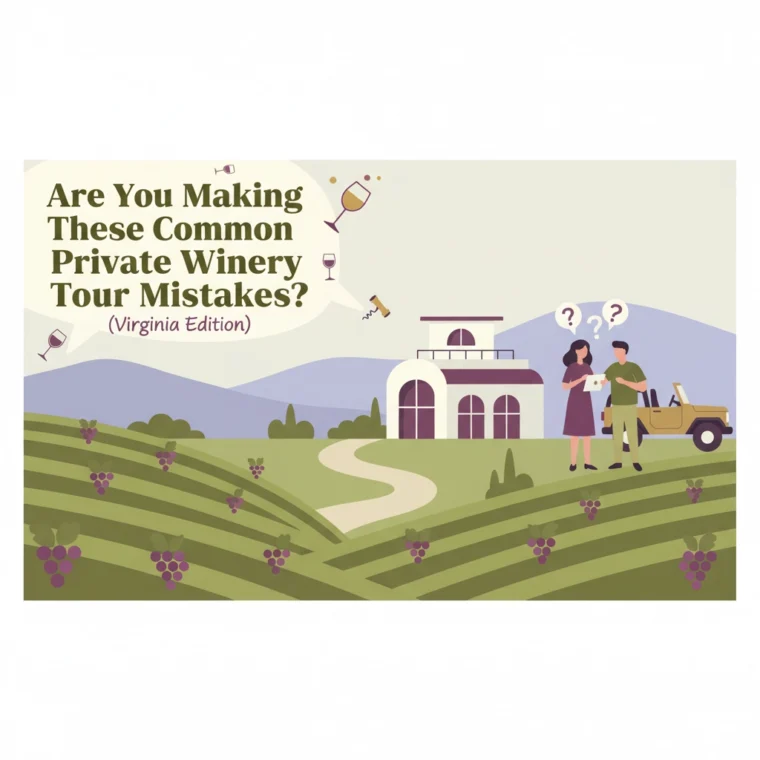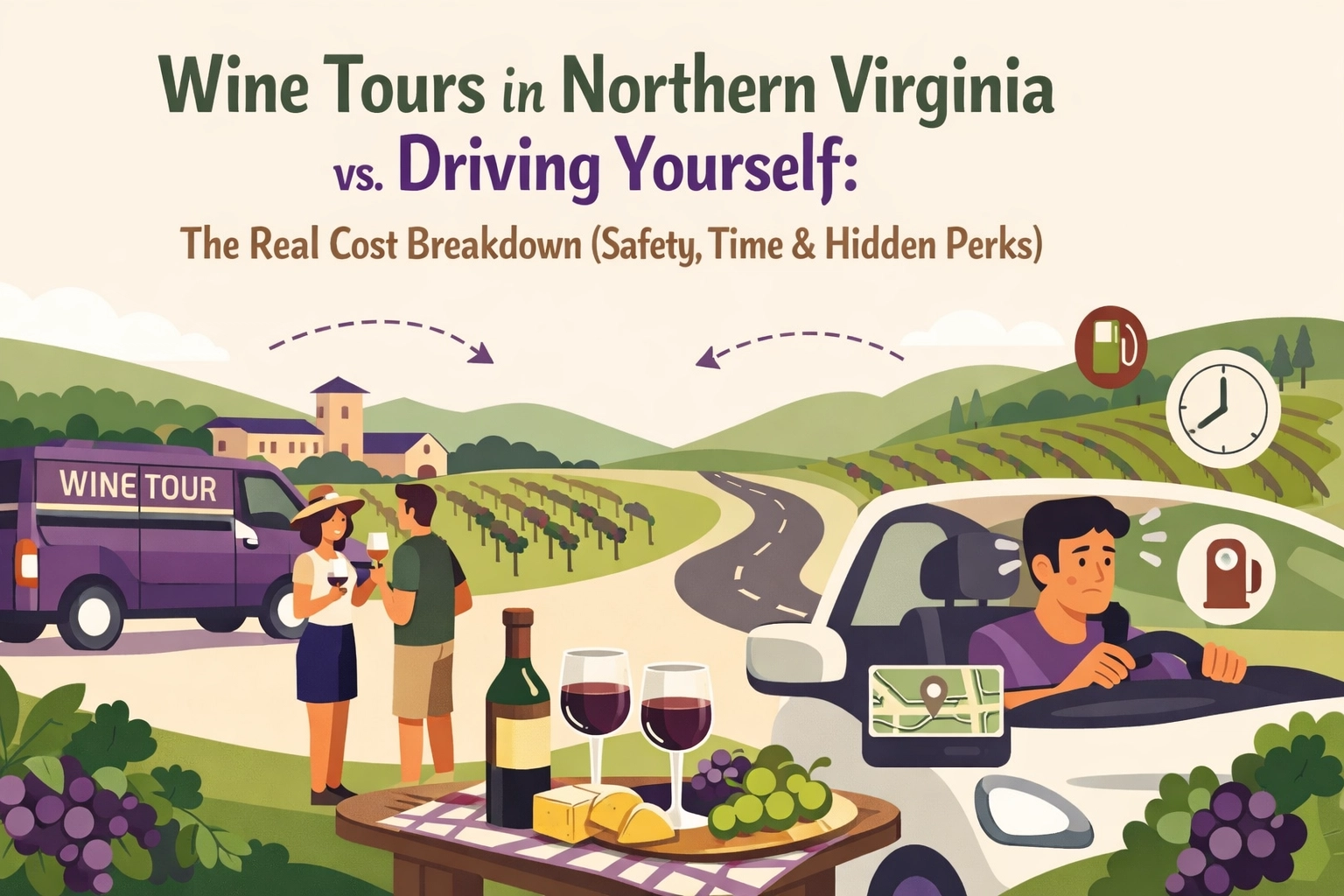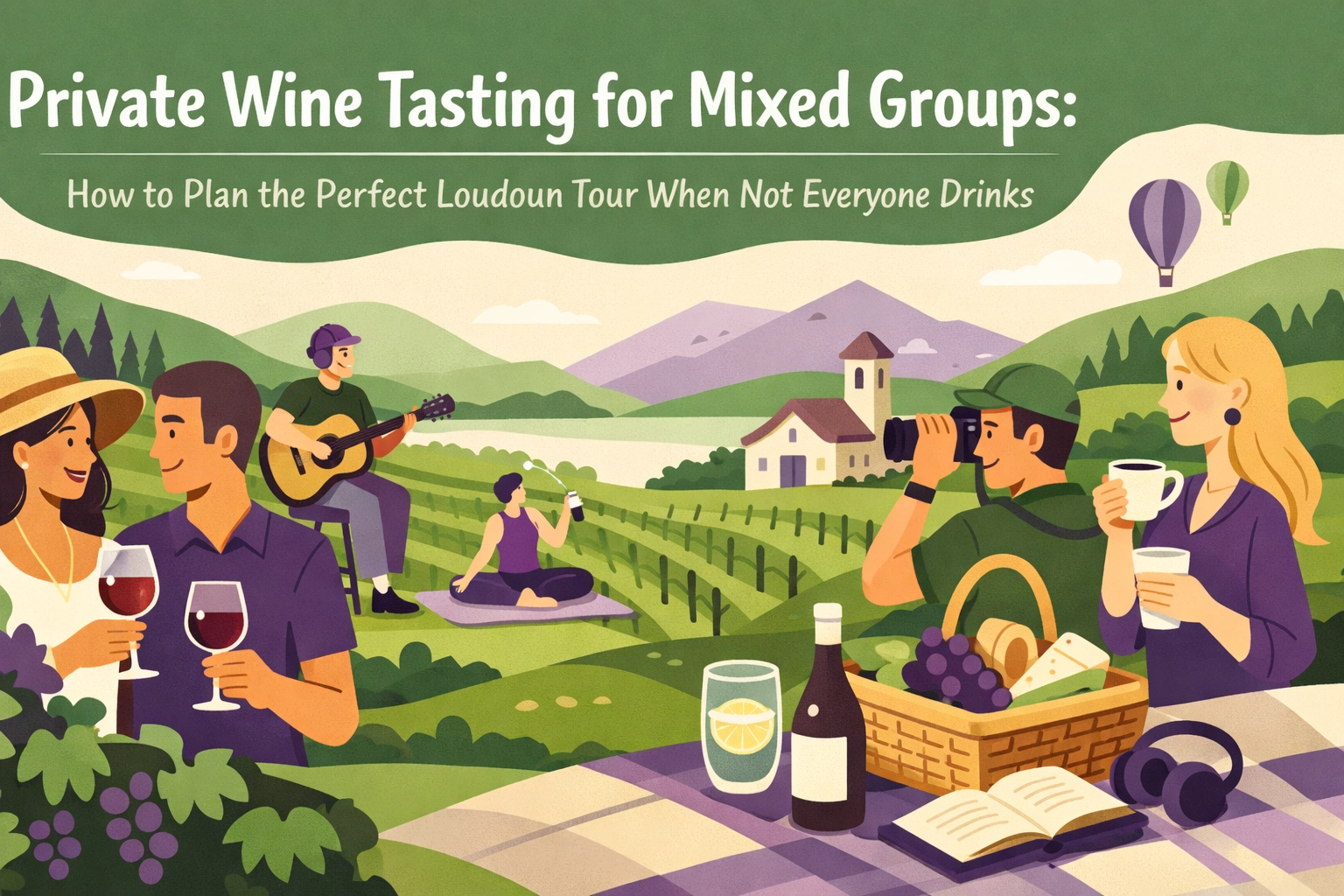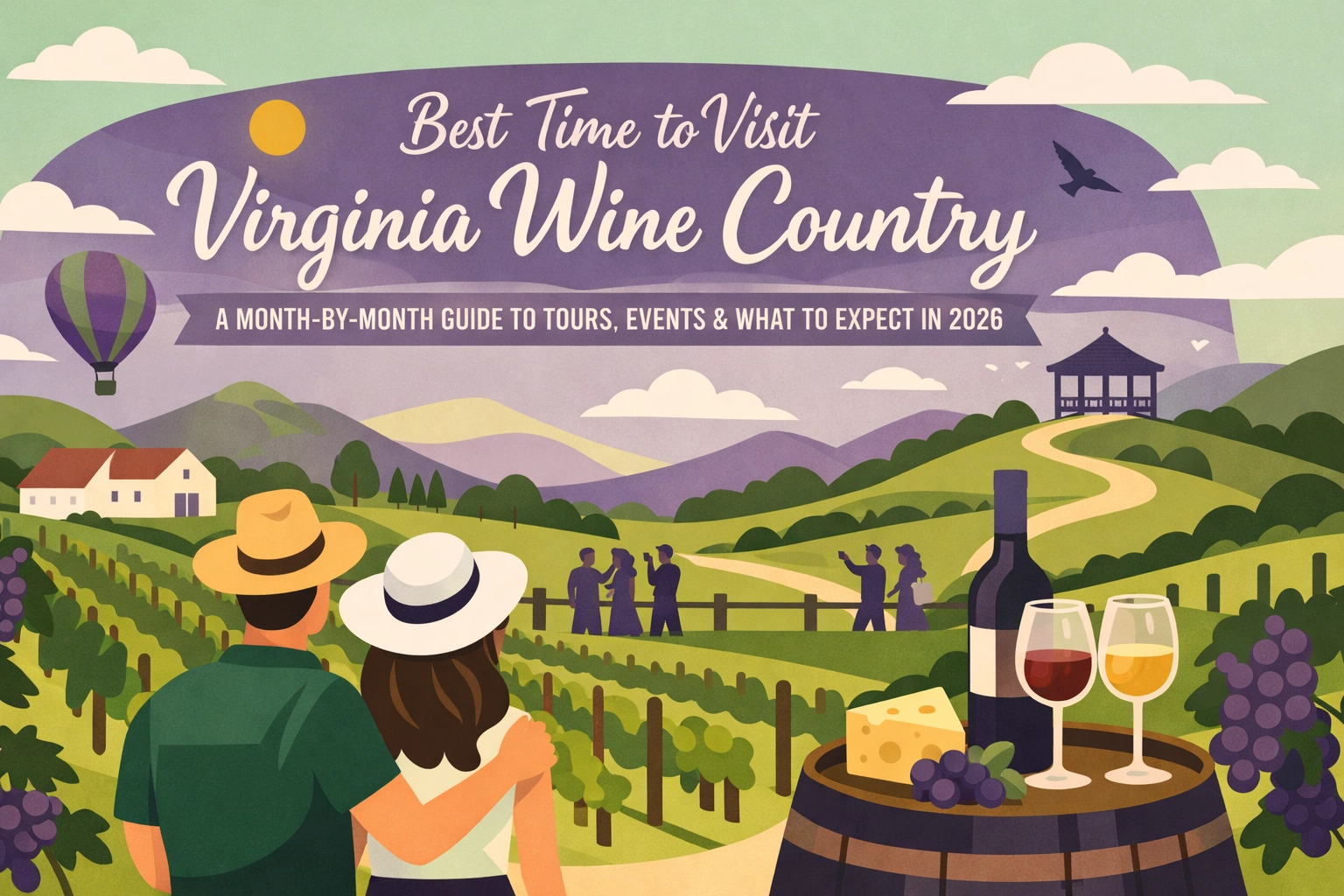Planning a private winery tour in Virginia should be one of the most relaxing and enjoyable experiences you can have. You're surrounded by rolling hills, world-class wines, and some of the friendliest people in the business. But here's the thing: I've seen too many visitors turn their perfect day into a stress-filled disaster by making totally avoidable mistakes.
After years of guiding wine lovers through Virginia's incredible wine country, I've noticed the same errors popping up again and again. The good news? Every single one of these mistakes is completely preventable with a little planning and know-how.
The Reservation Disaster
Let me start with the biggest mistake I see: showing up without reservations. I get it: wine touring feels spontaneous and carefree. But Virginia wineries aren't California mega-operations where you can just roll up anytime. Many of our best spots require appointments, especially for private tastings or vineyard tours.
Here's what happens when you don't call ahead: You drive 45 minutes to your dream winery only to find out they're booked solid for the day. Or worse, they're closed for a private event. I've watched disappointed couples sit in their cars trying to scramble together a backup plan while their perfect day slowly falls apart.
The fix is simple: call every winery on your list at least 48 hours in advance. Confirm they're open, ask about availability, and book your spots. Trust me, this one phone call will save your entire day.

Transportation Troubles
This mistake is a close second in the "day-ruining" category. I've seen people book sketchy tour operators who show up three hours late in the wrong vehicle, or worse: don't show up at all. Then there are the folks who plan to drive themselves and designate a "driver" who somehow forgets they can't taste wine.
If you're booking a tour service, do your homework. Read recent reviews, not just the five-star ones. Look for patterns in complaints: if multiple people mention late drivers or poor communication, run the other way.
For self-driving groups, decide on your designated driver before you leave the house, and make sure they're actually committed to staying sober. It sounds obvious, but I've seen too many "designated drivers" get caught up in the moment and ruin everyone's plans.
The Perfume Problem
This one drives winery staff absolutely crazy, and honestly, it should. When you douse yourself in cologne or perfume before a wine tour, you're basically bringing a fog machine to a library. Wine tasting is all about subtle aromas and delicate scents: your overpowering fragrance kills that for everyone in the room.
I once watched a perfectly lovely couple clear out an entire tasting room because the woman was wearing so much perfume that nobody could smell the wine. The staff was too polite to say anything, but you could see other visitors quietly moving away and cutting their tastings short.
Same goes for smoking before your tour. I know it's tempting to have a quick cigarette in the car, but that smell clings to your clothes and ruins your palate for hours. Save it for after your last stop.
Dress Code Disasters
Virginia wineries hit that sweet spot between casual and classy, but some visitors completely miss the mark. I've seen people show up in flip-flops and tank tops like they're hitting the beach, and others dressed like they're going to a black-tie dinner.
Here's the reality: You'll be walking on gravel paths, potentially touring vineyards, and moving between air-conditioned tasting rooms and warm outdoor patios. Comfortable walking shoes are non-negotiable: those cute heels will sink right into the grass. Layers are your friend because temperatures can vary dramatically throughout the day.
Think "elevated casual": nice jeans or slacks, comfortable shoes, and a shirt you wouldn't be embarrassed to wear to a nice restaurant.

The Hydration and Hunger Trap
This mistake sneaks up on people, especially first-time wine tourists. You're having so much fun tasting wine that you forget to eat or drink water. By your third winery, you're feeling dizzy, your palate is shot, and you're making poor decisions about which bottles to buy.
Pack snacks and water bottles in your car or bag. Most wineries are fine with you stepping outside for a quick snack between tastings. Some even encourage it because it keeps guests more engaged and helps them make better purchasing decisions.
If you're doing a full-day tour, plan lunch at a winery restaurant or nearby spot. Don't try to power through on cheese cubes and wine: you'll regret it later.
Treating Tasting Rooms Like Bars
Here's a mindset shift that will instantly improve your wine touring experience: tasting rooms are not bars. They're educational environments where the goal is to learn about and appreciate wine, not to get drunk.
I cringe when I see groups roll up acting like they're hitting happy hour, asking for "stronger pours" or trying to turn the experience into a party. Winery staff are trained educators who love sharing their knowledge: treat them like teachers, not bartenders.
This also means being respectful of other guests' experiences. Keep your voice down, don't monopolize the staff's time if others are waiting, and remember that this is someone's workplace and passion project.
The Preconception Problem
One of the biggest mistakes I see wine tourists make is deciding they don't like a wine before they even taste it. Maybe they had a bad Chardonnay once, so they refuse to try any white wines. Or they assume they won't like a wine based on its name or the winemaker's description.
Virginia wines are constantly evolving and surprising people. I've watched dedicated red wine drinkers fall in love with our Viogniers, and self-proclaimed "sweet wine only" people discover they love a bone-dry Cabernet Franc.
Approach each tasting with genuine curiosity. Try wines you think you won't like. Ask questions about the winemaking process. You might discover your new favorite variety hiding in a bottle you would have skipped.

The Note-Taking Miss
By the time you've visited three or four wineries, they all start blending together in your memory. Which winery had that amazing reserve Merlot? Where did you try the wine that reminded you of blackberries and vanilla?
Most wineries provide tasting sheets, but don't rely on them completely. Jot down your own notes: even just "loved this!" or "too oaky for me" can help when you're trying to remember which bottles to order later.
Take photos of wine labels you enjoyed, and snap a few pics of the wineries themselves. These visual reminders will help you remember the whole experience, not just the wines.
Unrealistic Winemaker Expectations
Here's a common disappointment: visitors expecting to meet the winemaker or owner at every stop. While Virginia's wine industry is more personal than California's massive operations, winemakers are often busy in the cellar, especially during harvest season.
The tasting room staff are usually incredibly knowledgeable and passionate about the wines they're serving. Many have been trained directly by the winemaker and can answer detailed questions about the vineyard and production methods. Give them a chance to share their expertise instead of being disappointed that the owner isn't pouring your wine personally.
Budget and Expectation Chaos
Nothing kills a wine tour faster than sticker shock or group arguments about money. Tasting fees in Virginia typically range from $15-25 per person, and bottles can cost anywhere from $18 to $60 or more for premium selections.
Discuss budgets with your group before you leave. How much are you comfortable spending on tastings? What's your bottle budget? Are you planning to buy wines to take home or just enjoy the experience?
Setting these expectations upfront prevents awkward moments when someone wants to buy expensive bottles while others are watching every penny.
The Timing Trap
Virginia wine country gets packed on weekend afternoons, especially during beautiful weather. If you're looking for an intimate, personalized experience, avoid these peak times.
Weekday visits offer more attention from staff, quieter tasting rooms, and often better opportunities to ask detailed questions about the wines. Early morning or late afternoon weekend visits can also provide a more relaxed atmosphere.
For the ultimate experience, consider visiting during less popular months like January or February. Many wineries offer special tastings or events during slower periods, and you'll have much more personal attention.
Making these simple adjustments to your Virginia wine tour planning will transform your experience from potentially stressful to absolutely magical. The best part? None of these tips require spending extra money: just a little preparation and awareness.
Virginia's wine country is ready to welcome you with open arms and exceptional wines. Don't let preventable mistakes keep you from having the incredible experience you deserve. Plan ahead, come prepared, and get ready to discover some truly amazing wines in one of the most beautiful regions in the country.
Ready to start planning your perfect Virginia wine tour? Check out our curated tour options designed to help you avoid these common mistakes and maximize your wine country experience.




